Masking against COVID-19: Should it stay or go in health care facilities?
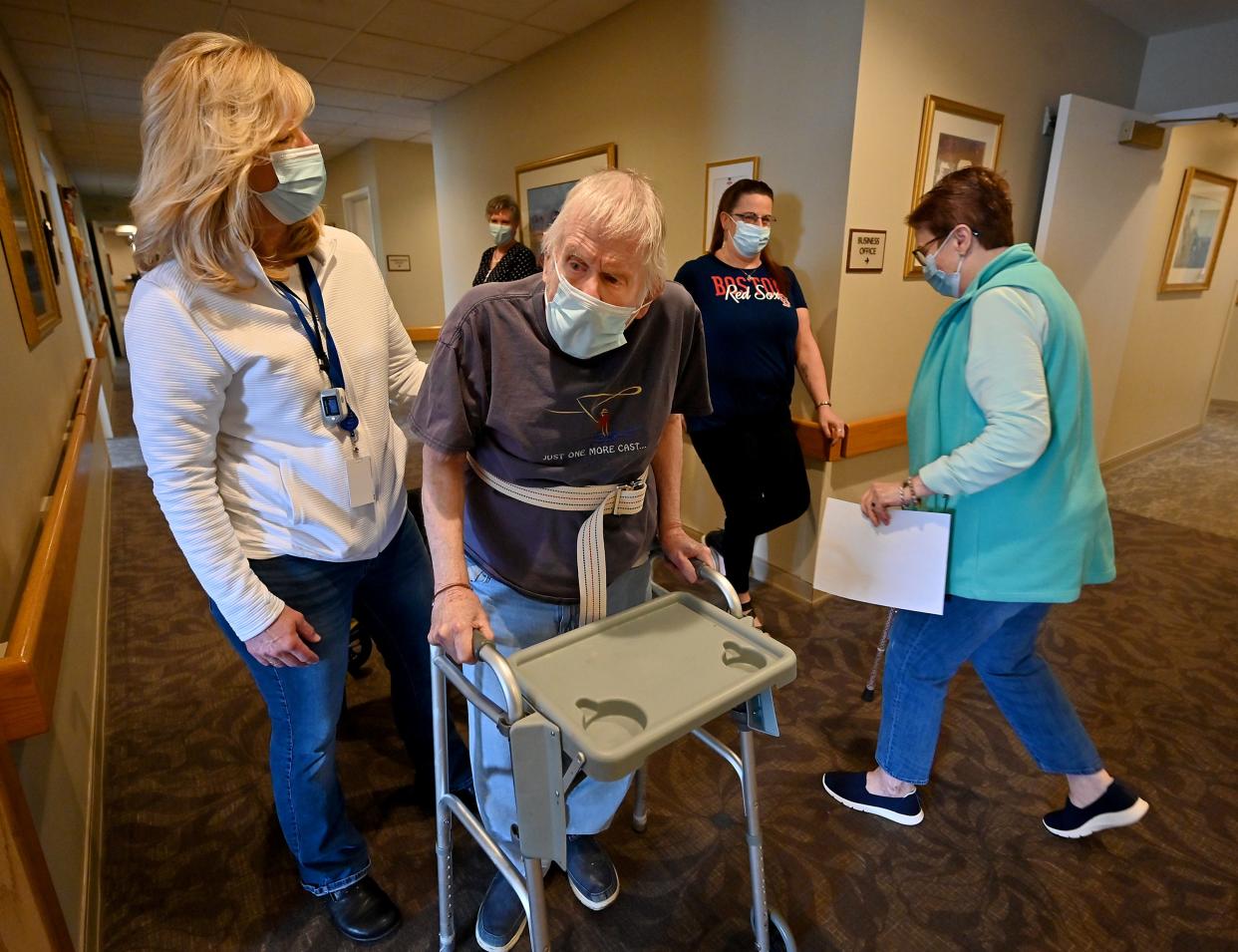
- Oops!Something went wrong.Please try again later.
WORCESTER – If the feelings at Christopher House are any indication, there is deep division in the health care community about wearing face masks to protect against COVID-19.
“I’m happy to get rid of them,” said Debbie Sherman, a physical therapist at the skilled nursing and rehabilitation facility on Belmont Hill.
Sherman explained masks limit her ability to interact with patients, a barrier to a personal connection that is vital to effective care. Also, some patients can't breathe sufficiently if they have to wear a mask, she said.
Down the hall, Linda Harris had a different opinion. A physical therapist assistant who has worked at Christopher House for 10 years, Harris believes masks must be worn to keep COVID-19 at bay and not risk the lives of patients.
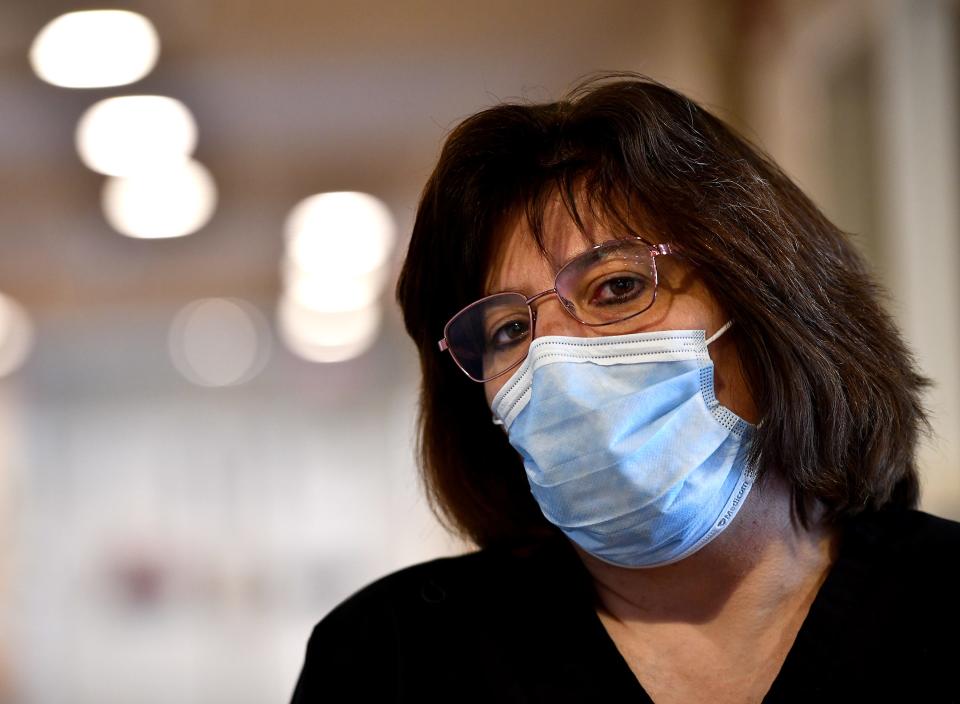
“We need to keep wearing masks,” said Harris. “It benefits patients and keeps them healthy.”
Divisions in health care
This small sample size could describe the divisions inside health care facilities across Massachusetts as the state announced it will end a universal mask mandate in health care settings on May 11. It's the same day the federal government officially declares an end to the COVID-19 public health emergency.
Gov. Maura Healey's administration will also declare an end to the state's emergency at that time.
The final call on lifting the mandate came from Massachusetts Executive Office of Health and Human Services.
The agency issued a prepared statement, citing information from the U.S. Centers for Disease Control and Prevention, plus falling COVID infection numbers, as the basis for its decision.
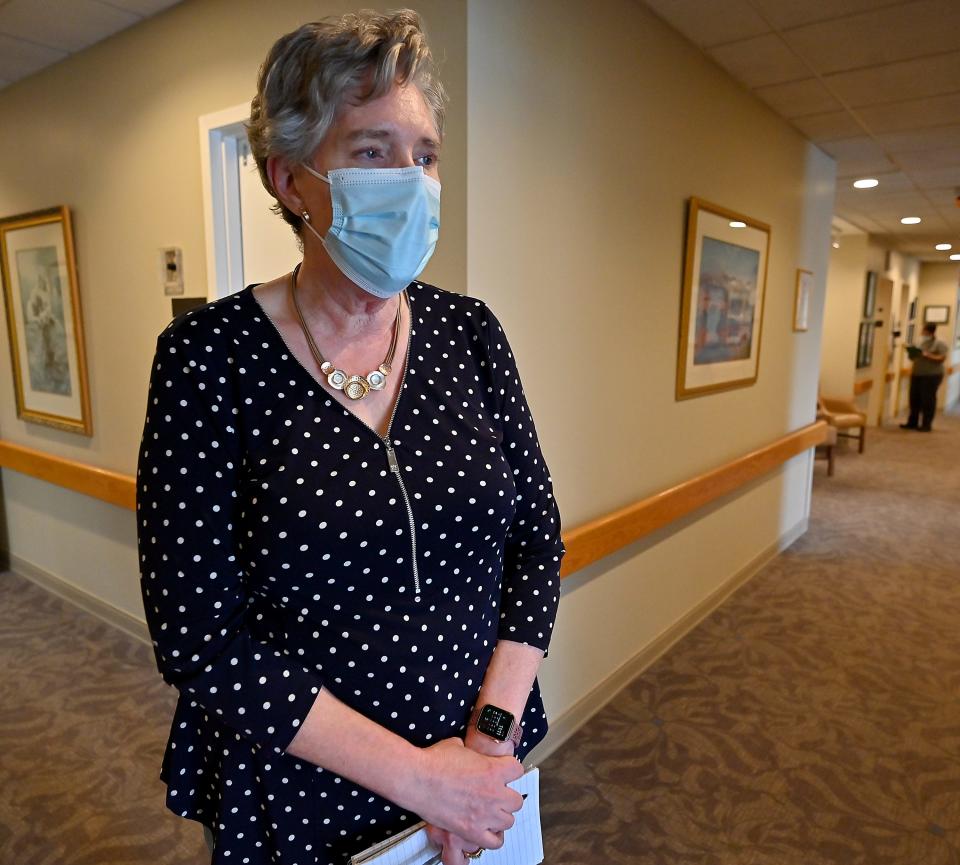
“This decision is aligned with CDC guidance and federal requirements based on transmission rates, and was made following extensive conversations with health care experts. The Department of Public Health will continue to carefully track COVID-19 cases in Massachusetts and adjust as circumstances change.”
Virus remains
There’s no doubt the number of COVID infections and deaths have fallen for months. However, the virus remains in Massachusetts.
The latest numbers from the state Department of Public Health for the week that ended Wednesday show 23 confirmed deaths statewide and 1,845 new confirmed cases.
At UMass Memorial Health, the DPH report indicated a total of 19 confirmed COVID hospitalizations, plus five COVID-confirmed patients in the hospital system's intensive care unit.
Worcester ended its weekly COVID report, citing low transmission levels and next month’s end to the public health emergency. The city’s top public health official supports masking.
“From a professional point of view, masking helped stop the spread of COVID-19, especially when there was no vaccine,” said Soloe Dennis, Worcester’s director of public health. “Masking is the only tool in the toolbox that kept folks alive.”
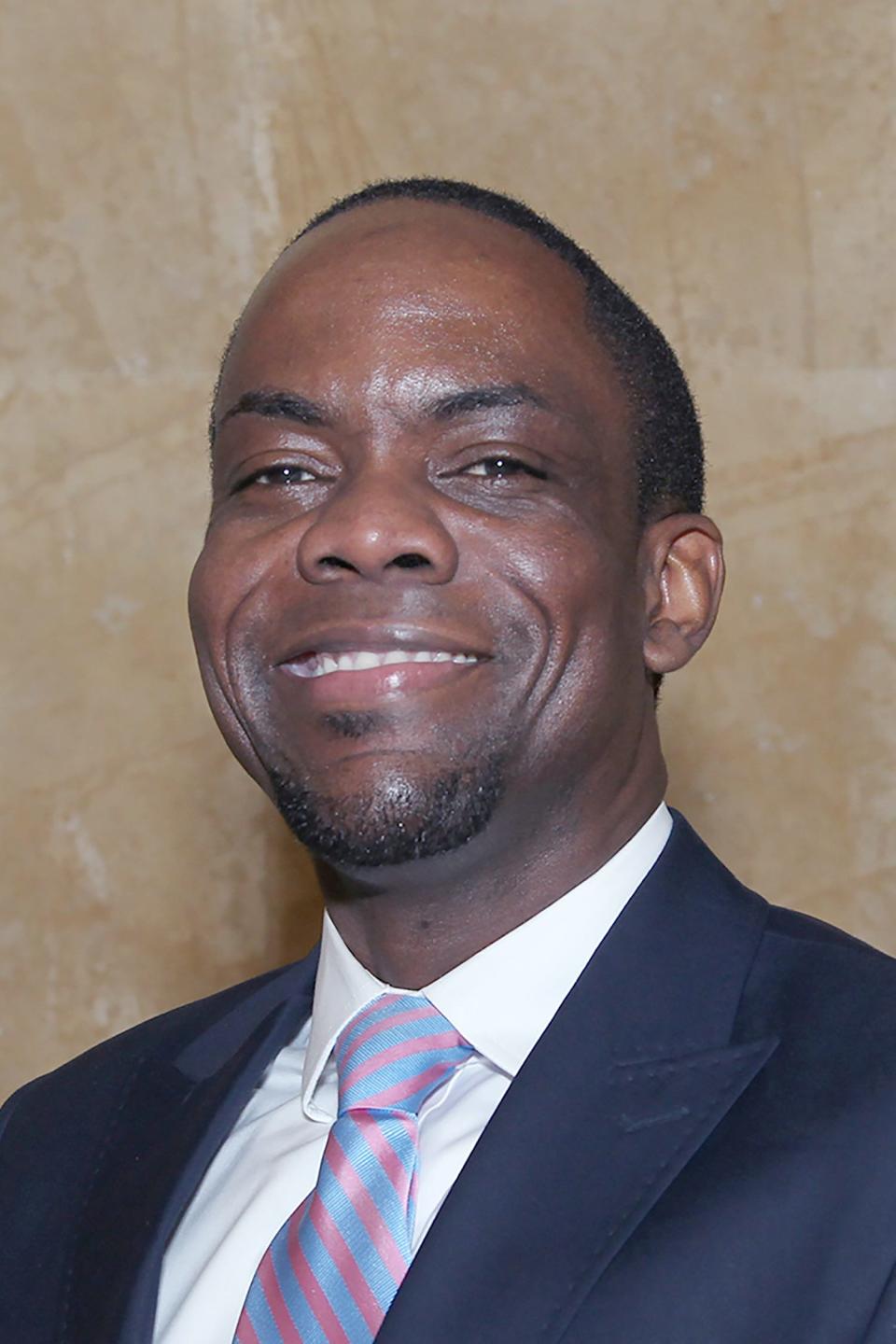
When May 11 arrives, Dennis supports masking, especially to protect those with preexisting health challenges.
“From a science perspective, it makes sense,” said Dennis. “From a public health perspective, it makes sense because we’re in the business of saving lives.”
Hospitals on hold with decisions
UMass Memorial Health, the largest employer in Central Massachusetts with more than 17,000 employees, hasn’t decided if it will end masking on May 11.
Dr. Richard Ellison, an infection disease physician at UMass Memorial Health, said hospital leaders are “intensely” weighing options. Ellison said he will wear a mask on May 11 and beyond for two reasons: His age puts him in a higher-risk category for the virus, and he doesn’t want to do anything to put his patients at risk.
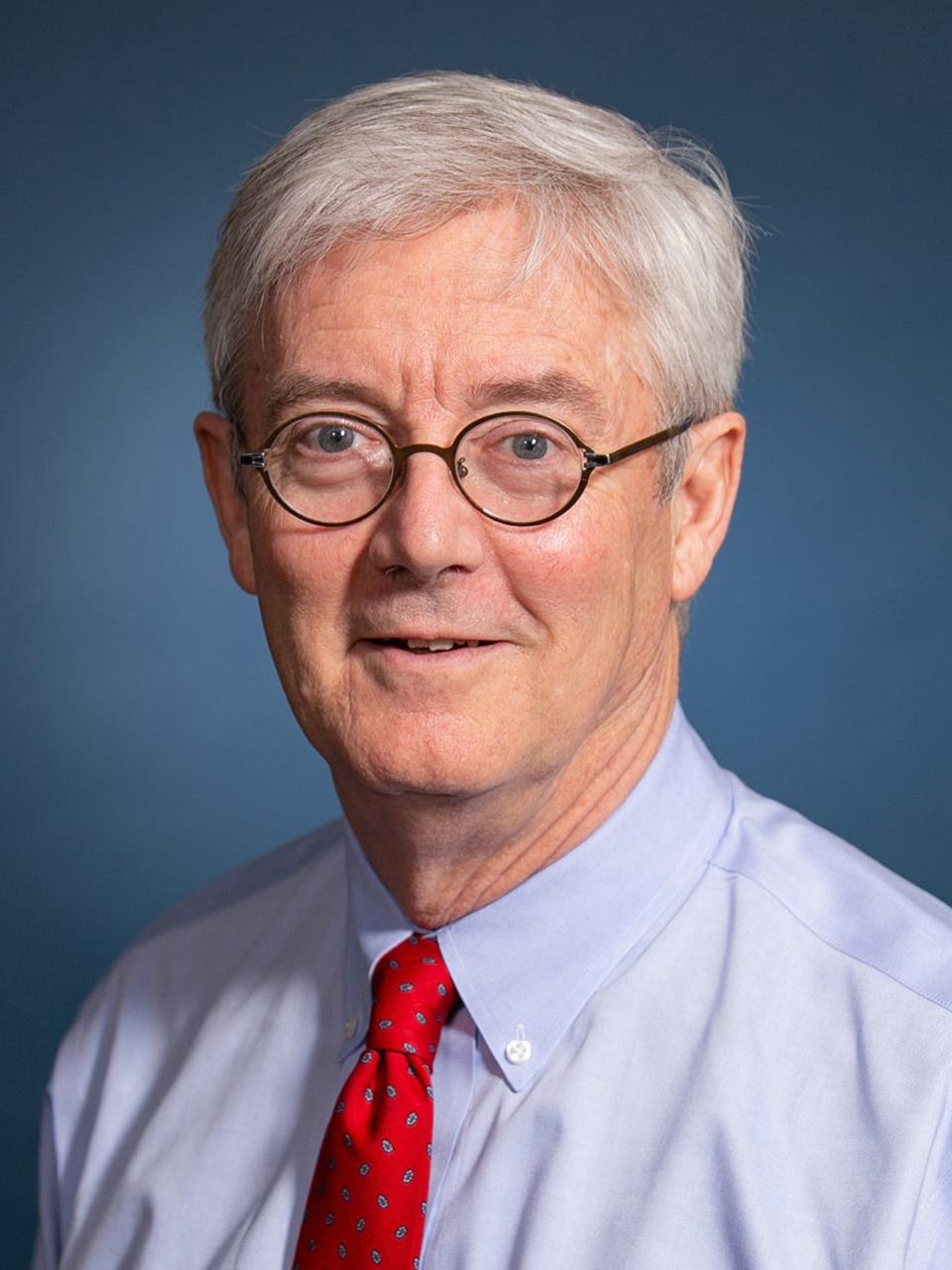
“I personally will wear a mask,” said Ellison.
In a prepared statement, St. Vincent Hospital said it will change its masking policy: “Saint Vincent Hospital is in the process of revising our masking policy to align with the May 11th lifting of both the state and federal COVID-19 public health emergency orders.”
The Edward M. Kennedy Community Health Center, with more than 30,000 patients served at facilities in Worcester, Framingham and Milford, is also moving in the direction of ending masking on May 11.
“We are waiting to see if the DPH has further guidance once the health emergency ends to make our decision,” said a prepared statement from Kennedy Health. “If there is no other guidance, we will follow their decision not to institute face mask requirements but reserve the right to reinstate the wearing of face masks as needed within our health care facilities.”
Opposition
The Massachusetts Coalition for Health Equity, comprising public health experts, doctors, patients and community leaders, is pushing the state to keep the mask mandate in place.
“This is about patient autonomy, people having control over their own bodies and being able to make their owns decisions about risk exposure to COVID-19,” said Dr. Lara Jirmanus, the coalition’s cofounder, a clinical instructor at Harvard Medical School and a primary care physician in Revere.
COVID-19 is in the air we breathe, said Jirmanus, and if some people are unmasked, others will be exposed to the virus against their will. That creates a potential life-or-death situation that the coalition strongly opposes.
"Every issue in medicine, you have look at the risk-benefit analysis. There's clearly risks of removing masks. Vulnerable patients could get infected and die," said Jirmanus.
More details on Mass. decision
The state Executive Office of Health and Human Services noted masking will continue after May 11 at some facilities, including those certified by the Center for Medicare and Medicaid Services, depending on CDC transmission levels.
Also, counties with “high” transmission levels will require mask for all patients, visitors and staff.
The decision to end the mandate wasn’t made in a vacuum, according to the state Executive office of Health and Human Services. It explained infection control leaders at several of the state’s largest hospital systems repeatedly asked the DPH to end the state mandate in advance of May 11.
The request was also made by infectious disease doctors, said state officials, and by a Healthcare Associated Infection Technical Advisory Group comprising infectious disease physicians and providers in Massachusetts, including hospitals.
If COVID infections rise in the future, the mask requirement could return, said state officials. Plus, health care facilities must have an infection control and prevention plan in place that can include masking.
Tough spot
The impending end of the mask mandate has put some health care leaders in a tough spot, including Sandra Mahoney, the top administrator at Christopher House.
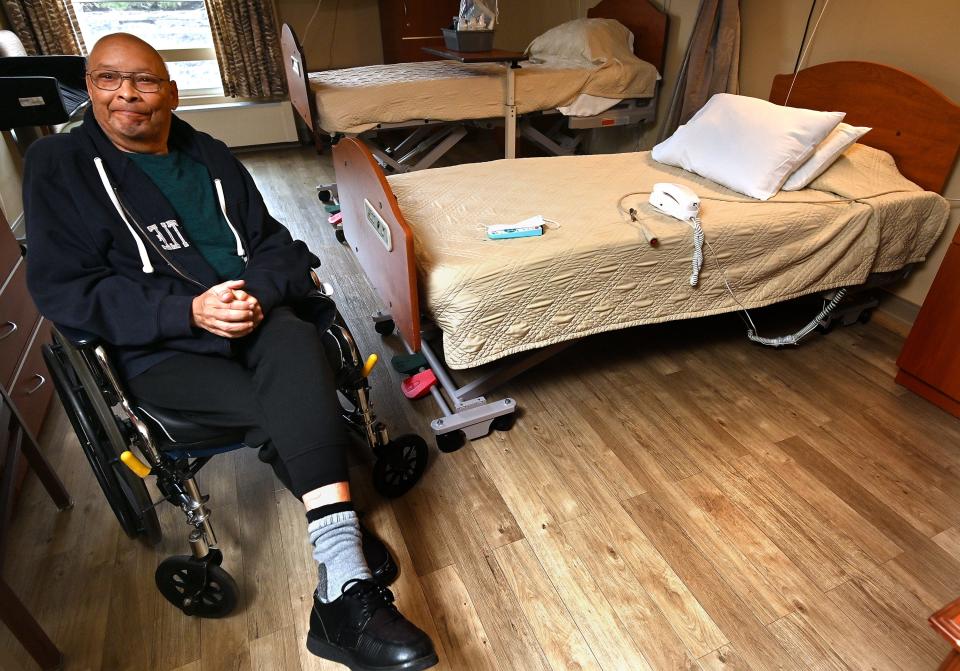
“I’m deeply ambivalent,” said Mahoney, as she faces a camp of employees that see masks as a burden, while others believe they’re necessary to protect the lives of patients and staff.
There’s also the reality of keeping the place running. Mahoney needs staff, and said if Christopher House decides to retain a mask requirement on May 11, attracting employees, especially those averse to wearing a mask, could be a challenge.
A tough decision awaits Christopher House, especially given the trauma caused by COVID-19. Mahoney said a number of patients died in the first year of the pandemic, and hundreds of patients and staff caught the virus.
Ultimately, Mahoney will lift the mandate at Christopher House if state epidemiologists rule it's safe to take that step on May 11.
“If they say it’s safe, then I’ll go for it,” she said.
Patients weigh in
No matter what side of the coin one falls on, most would likely agree that patient opinions matter when it comes to a decision about ending or retaining the mask mandate.
At Christopher House, some patients clearly favor masking.
“You want to live. Keep them on,” said 88-year-old Donald Brickman, a Christopher House resident for the past three years.
Bruce Adams, rehabilitating at the facility before heading back to his home in Oxford, also is in the masking camp.
“It’s a good idea for protection, basically. There are a lot of antigens out there,” said Adams.
Contact Henry Schwan at henry.schwan@telegram.com. Follow him on Twitter @henrytelegram
This article originally appeared on Telegram & Gazette: Opinions differ as Massachusetts is prepared to end COVID-19 masking

